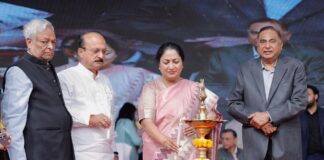Three months after the May military clash between India and Pakistan, both nations continue to present contrasting narratives. Pakistan’s Chief of Army Staff, Field Marshal Asim Munir, has now claimed that Pakistan emerged victorious in the confrontation, while questioning India’s self-proclaimed status as a ‘Vishwaguru’ (world leader).
Table of Contents

Munir’s remarks come just days after Indian Army Chief General Upendra Dwivedi and Indian Air Force Chief Air Chief Marshal A.P. Singh issued separate statements regarding Operation Sindoor, India’s counter-offensive following the April Pahalgam terror attack.
Indian Military Leaders Highlight Operation Sindoor’s Strategic Edge
On August 4, General Dwivedi addressed a gathering at IIT Madras, describing Operation Sindoor as “unlike any conventional mission.” He revealed that the operation was designed in direct response to the April 22 Pahalgam attack and targeted militant camps in Pakistan and Pakistan-administered Kashmir on the night of May 6–7.

The Indian Army chief also emphasized the importance of “narrative management,” suggesting that perceptions of victory vary. “If you ask a Pakistani whether they won or lost, they’ll say: ‘Our chief became Field Marshal — we won, that’s why he was promoted,’” Dwivedi quipped, referring to Munir’s elevation shortly after the conflict.
Earlier that day, Air Chief Marshal A.P. Singh claimed that during the May clashes, the Indian Air Force shot down five Pakistani fighter jets and one large aircraft. However, Pakistan’s Defence Minister Khawaja Asif quickly dismissed this claim.
Background: How the May 2025 India–Pakistan Clash Began
The tensions erupted after the April 22 terror attack in Jammu and Kashmir’s Pahalgam. India accused Pakistan-based groups of orchestrating the assault and responded with targeted strikes in Pakistan and Pakistan-administered Kashmir.
By May 10, both nations agreed to a ceasefire. At that time, Pakistan claimed to have downed five Indian fighter jets, a claim India strongly rejected.
Asim Munir’s US Visit and Anti-India Rhetoric
The Inter-Services Public Relations (ISPR) confirmed Munir’s visit to the United States, where he attended a change-of-command ceremony at the US Central Command (CENTCOM) headquarters in Tampa. Munir praised retiring US General Michael Erik Kurilla for strengthening bilateral military ties.
Addressing the Pakistani community at a private event, Munir asserted that Pakistan had successfully fought a “diplomatic war” against India’s “discriminatory and double-standard policies.” He repeated a familiar line, calling the migration of Pakistanis abroad “brain gain” rather than brain drain.
On the May conflict, Munir declared: “India wants to present itself as a ‘Vishwaguru,’ but in practice, it is far from that reality.” He accused India’s intelligence agency, RAW, of involvement in “international terrorism,” citing the killing of a Sikh leader in Canada, the detention of eight Indian naval officers in Qatar, and the case of Kulbhushan Jadhav — all allegations New Delhi has repeatedly denied.
Warning of Escalation and Trump’s Role in Ceasefire
Munir warned that the India–Pakistan conflict had pushed the region to “the brink of a dangerous war” where even a small miscalculation could have led to a larger confrontation.
He thanked former US President Donald Trump for his role in brokering the ceasefire. “Pakistan is deeply grateful to President Trump, whose strategic leadership prevented not only an India–Pakistan war but also multiple other conflicts worldwide,” Munir said.
Trump has often credited himself with mediating the ceasefire, but India maintains that the truce was the result of Pakistan approaching New Delhi with a proposal. Recently, Prime Minister Narendra Modi categorically denied in Parliament any third-party “mediation” in the matter.
Kashmir Remains Central in Pakistan’s Narrative
In his address, Munir called Kashmir an “unfinished international agenda” and hailed Pakistan’s “recent successes” against India in the diplomatic and security spheres as a blessing from Allah, combined with national unity, political foresight, and military resolve.
“The question is no longer whether we will rise,” he said. “The question is how quickly and how strongly we will rise.”
India and Pakistan’s Competing Victory Claims
While Munir described Pakistan’s response to the conflict as “decisive and forceful,” Indian military leaders have framed Operation Sindoor as a sophisticated, chess-like manoeuvre aimed at neutralizing threats and gaining strategic advantage.
General Dwivedi stressed that both sides attempted to anticipate and counter each other’s moves during the operation. Meanwhile, Air Chief Marshal Singh’s claim of downing multiple Pakistani aircraft directly counters Pakistan’s narrative.
Diplomacy, Propaganda, and the Continuing War of Words
The May 2025 conflict may have ended militarily, but it has unleashed a persistent war of words between New Delhi and Islamabad. While Pakistan’s leadership frames the episode as proof of military strength and diplomatic resilience, India continues to highlight its precision operations and strategic gains.
With Kashmir still at the heart of their disagreements and both nations accusing each other of destabilizing activities, the possibility of future flare-ups remains a looming concern for regional stability.










